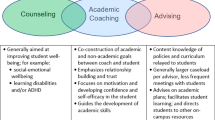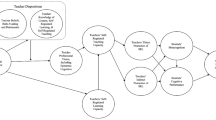Abstract
Academic coaching is an increasingly prevalent form of student support in higher education, although empirical research on the intervention is relatively limited (Robinson, 2015). Academic coaching is intended to advance student learning, well-being, and success in a context external but complementary to the classroom (Richman, Rademacher, & Maitland, 2014; Robinson, 2015). This exploratory study used a randomized control trial design to investigate the effects of academic coaching on college students’ metacognition, a primary component of self-regulated learning. We recruited undergraduates who had not previously participated in academic coaching and randomly assigned them to three groups: in-person academic coaching, online academic coaching, and control. All participants completed a pre- and post-test instrument that included the Metacognitive Awareness Inventory (MAI; Schraw & Dennison, 1994). Results showed that students who received academic coaching had increased metacognition as measured by MAI subscales. Increases in metacognitive awareness occurred in both the in-person and online academic coaching conditions. However, repeated measures ANOVAs did not reveal differences between the three conditions. Overall preliminary results suggest that academic coaching may be a promising student support intervention for helping develop college students’ metacognition outside of the classroom environment.
Similar content being viewed by others
Data Availability
N/A
References
Alexander, G. & Renshaw, B. (2005). Supercoaching: The missing ingredient for high performance. Random House.
Arendale, D. R. (2010). Access at the crossroads: Learning assistance in higher education. ASHE Higher Education Report, 35, 1–145. https://doi.org/10.1002/aehe.3506.
Arendale, D. R. (2004). Mainstreamed academic assistance and enrichment for all students: The historical origins of Learning Assistance Centers. Research for Educational Reform, 9, 3–21.
Bellman, S., Burgstahler, S., & Hinke, P. (2015). Academic coaching: Outcomes from a pilot group of postsecondary STEM students with disabilities. Journal of Postsecondary Education and Disability, 28, 103–108. Retrieved from https://eric.ed.gov/?id=EJ1066319.
Ben-Eliyahu, A. & Bernacki, M. L. (2015). Addressing complexities in self-regulated learning: A focus on contextual factors, contingencies, and dynamic relations. Metacognition and Learning, 10, 1–13. https://doi.org/10.1007/s11409-015-9134-6.
Bettinger, E. & Baker, R. (2014). The effects of student coaching: An evaluation of a randomized experiment in student advising. Educational Evaluation and Policy Analysis, 36(1), 3–19. https://doi.org/10.3102/0162373713500523.
Boekaerts, M. (1995). Self-regulated learning: Bridging the gap between metacognitive and metamotivation theories. Educational Psychologist, 30(4), 195–200. https://doi.org/10.1207/s15326985ep3004_4.
Boekaerts, M. & Corno, L. (2005). Self-regulation in the classroom: A perspective on assessment and intervention. Applied Psychology: An International Review, 54, 199–231. https://doi.org/10.1111/j.1464-0597.2005.00205.x.
Bruijn-Smolders, M., Timmers, C., Gawke, J., Schoonman, W., & Born, M. (2016). Effective self-regulatory processes in higher education: Research findings and future directions. A systemic review. Studies in Higher Education, 41(1), 139–158. https://doi.org/10.1080/03075079.2014.915302.
Capstick, M. K., Harrell-Williams, L. M., Cockrum, C. D., West, & Steven L. (2019). Exploring the effectiveness of academic coaching for academically at-risk college students. Innovative Higher Education, 44(3), 219–231, https://doi.org/10.1007/s10755-019-9459-1.
Claessens, B. van Eerde, W., Rutte, C., & Roe, R. (2007). A review of the time management literature. Personnel Review, 36(2), 255–276. https://doi.org/10.1108/00483480710726136.
Cohen, J. (1988). Statistical power analysis for the behavioral sciences (2nd edition). Lawrence Earlbaum Associates.
Cornford, I. (2002). Learning to learn strategies as a basis for effective lifelong learning. International Journal of Lifelong Education, 21, 357–368. https://doi.org/10.1080/02601370210141020.
De Backer, L., Van Keer, H., & Valcke, M. (2012). Exploring the potential impact of reciprocal peer tutoring on higher education students’ metacognitive knowledge and regulation. Instructional Science, 45, 559–588. https://doi.org/10.1007/s11251-011-9190-5.
DiFrancesca, D., Nietfeld, J., & Cao, L. (2016). A comparison of high and low achieving students on self-regulated learning variables. Learning and Individual Differences, 45, 228–236. https://doi.org/10.1016/j.lindif.2015.11.010.
Efklides, A. (2011). Interactions of metacognition with motivation and affect in self-regulated learning: The MASRL model. Educational Psychologist, 46(1), 6–25. https://doi.org/10.1080/00461520.2011.538645.
Field, S., Parker, D., Sawilowsy, S., & Rolands, L. (2013). Assessing the impact of ADHD coaching services on university students’ learning skills, self-regulation, and well-being. Journal of Postsecondary Education and Disability, 26(1), 67–81. Retrieved from https://files.eric.ed.gov/fulltext/EJ1026813.pdf.
Follmer, J. & Sperling, R. (2016). The mediating role of metacognition in the relationship between executive function and self-regulated learning. British Journal of Educational Psychology, 86(4), 559–575. https://doi.org/10.1111/bjep.12123.
Franklin, J. & Doran, J. (2009) Does all coaching enhance objective performance independently evaluated by blind assessors? The importance of the coaching model and content. International Coaching Psychology Review, 4(2), 128–144.
Grant, A. (2013). The efficacy of coaching. In J. Passmore, D. Peterson, & T. Freire (Eds.), The Wiley-Blackwell handbook of the psychology of coaching and mentoring (pp. 15–39). Malden, MA: John Wiley & Sons, Ltd.
Greene, J. A. (2018). Self-regulation in education. Taylor & Francis.
Gynnild, V., Holstada, A., & Myrhaug, D. (2008). Identifying and promoting self-regulated learning in higher education: Roles and responsibilities of student tutors. Mentoring & Tutoring: Partnership in Learning, 16(2), 147–161. https://doi.org/10.1080/13611260801916317.
Hartman, H., & Sternberg, J. (1993). A broad BACIES for improving thinking. Instructional Science, 21, 401–425.
Hattie, J., Biggs, J., & Purdie, N. (1996). Effects of learning skills interventions on student learning: A meta-analysis. Review of Educational Research, 66, 99–136. https://doi.org/10.3102/00346543066002099.
Howlett, M. A., McWilliams, M. A., Rademacher, K., Maitland, T. L., O’Neill, J. C., Abels, K., Demetriou, C. & Panter, A. T. (2020) An Academic Coaching Training Program for University Professionals: A Mixed Methods Examination. Journal of Student Affairs Research and Practice. https://doi.org/10.1080/19496591.2020.1784750.
Hurme, T. L., Palonen, T., & Järvelä, S. (2006). Metacognition in joint discussions: An analysis of the patterns of interaction and the metacognitive content of the networked discussions in mathematics. Metacognition and Learning, 1, 181–200. https://doi.org/10.1007/s11409-006-9792-5.
Hutson, B. (2006). Monitoring for success: Implementing a proactive probation program for diverse, at-risk college students (Doctoral dissertation). Retrieved from https://search.proquest.com/docview/305282691.
Kallay, E. (2012). Learning strategies and metacognitive awareness as predictors of academic achievement in a sample of Romanian second-year students. Cognition, Brain, Behavior. An Interdisciplinary Journal, 16(3), 369–385.
Kimsey-House, H., Kimsey-House, K., Sandahl, P., & Whitworth, L. (2018). Co-active Coaching, Fourth edition. Nicholas Brealey Publishing.
Kitsantas, A., Winsler, A., & Hue, F. (2008). Self-regulation and ability predictors of academic success during college: A predictive validity study. Journal of Advanced Academics 20(1), 42–68. https://doi.org/10.4219/jaa-2008-867.
Kuhn, D. (2000). Metacognitive development. Current Directions in Psychological Science, 9(5), 178–181. https://doi.org/10.1111/1467-8721.00088.
Losch, S., Traut-Mattausch, E., Mühlberger, M., & Jonas, E. (2016). Comparing the effectiveness of individual coaching, self-coaching, and group training: How leadership makes the difference. Frontiers in Psychology, 7, 629. https://doi.org/10.3389/fpsyg.2016.00629.
Maclellan, E., & Soden, R. (2006). Facilitating self-regulation in higher education through self-report. Learning Environments Research, 9, 95–110. https://doi.org/10.1007/s10984-005-9002-4.
McGuire, S. Y. & McGuire, S. (2015). Teach students how to learn: Strategies you can incorporate into any course to improve student metacognition, study skills, and motivation. Stylus Publishing, LLC.
Meijer, J., Veenman, M. V. J., & van Hout-Wolters, B. H. A. M. (2006). Metacognitive activities in text studying and problem-solving: Development of a taxonomy. Educational Research and Evaluation, 12, 209–237. https://doi.org/10.1080/13803610500479991.
Moos, D. C., & Azevedo, R. (2009). Self-efficacy and prior domain knowledge: To what extent does monitoring mediate their relationship with hypermedia learning? Metacognition and Learning, 4, 197–216. https://doi.org/10.1007/s11409-009-9045-5.
Muis, K. (2007). The role of epistemic beliefs in self-regulated learning. Educational Psychologist, 42(3), 173–190. https://doi.org/10.1080/00461520701416306.
Pintrich, P. (2000). The role of goal orientation in self-regulated learning. In M. Boekaerts, P. Pintrich & M. Zeidnder (Eds.), Handbook of self-regulation (pp. 451–502). Academic Press.
Pintrich, P. (2004). A conceptual framework for assessing motivation and self-regulated learning in college students. Educational Psychology Review, 16(4), 385–407. https://doi.org/10.1007/s10648-004-0006-x.
Prevatt, F. & Yelland, S. (2015). An empirical evaluation of ADHD coaching in college students. Journal of Attention Disorders, 19(8), 666-677. https://doi.org/10.1177/1087054713480036.
Reeves, T. D. (2009). Toward a treatment effect of an intervention to foster self-regulated learning (SRL): An application of the Rasch Model (Doctoral Dissertation). Retrieved from ProQuest Dissertations Publishing (1469123).
Reeves, T. D., & Stich, A. E. (2011). Tackling suboptimal bachelor’s degree completion rates through training in self-regulated learning (SRL). Innovative Higher Education, 36, 3–17. https://doi.org/10.1007/s10755-010-9152-x.
Richardson, M., Abraham, C., & Bond, R. (2012). Psychological correlates of university students’ academic performance: A systemic review and meta-analysis. Psychological Bulletin, 138(2), 353–387.
Richman, E., Rademacher, K., & Maitland, T. (2014). Coaching and college success. Journal of Postsecondary Education and Disability, 27(1), 33–52. Retrieved from https://files.eric.ed.gov/fulltext/EJ1029647.pdf.
Robinson, C. E. (2015). Academic/success coaching: A description of an emerging field in higher education (Doctoral dissertation). University of South Carolina Scholar Commons. Retrieved from https://scholarcommons.sc.edu/etd/3148.
Rosenshine, B., Meister, C., & Chapman, S. (1996). Teaching students to generate questions: A review of the intervention studies. Review of Educational Research, 66, 181–221. https://doi.org/10.3102/00346543066002181.
Schraw, G., & Dennison, R. S. (1994). Assessing metacognitive awareness. Contemporary Educational Psychology, 19, 460–475. https://doi.org/10.1006/ceps.1994.1033.
Schunk, D. H. & Greene, J. A. (2018). Historical, contemporary, and future perspectives on self-regulated learning and performance. In D.H. Schunk & J.A. Greene (Eds.), Handbook of self-regulation of learning and performance (pp. 1–15). Taylor & Francis.
Schunk, D. H. & Mullen, C. A. (2013). Toward a conceptual model of mentoring research: Integration with self-regulated learning. Educational Psychology Review, 25, 361–389. https://doi.org/10.1007/s10648-013-9233-3.
Seli, H., & Dembo, M. H. (2016). Motivation and learning strategies for college success: A focus on self-regulated learning (5th ed.). New York, NY: Routledge.
Seligman, M. (2011). Flourish: A visionary new understanding of happiness and well-being. Free Press.
Shadish, W. R., Cook, T. D., & Campbell, D. T. (2002). Experimental and quasi-experimental designs for generalized causal inference. Houghton Mifflin.
Sitzmann, T. & Ely, K. (2011). A meta-analysis of self-regulated learning in work-related training and educational attainment: What we know and where we need to go. Psychological Bulletin, 137(3), 421–442. https://doi.org/10.1037/a0022777.
Spence, G., & Grant, A. (2007). Professional and peer life coaching and the enhancement of goal striving and well-being: An exploratory study. The Journal of Positive Psychology, 2(3), 185–194. https://doi.org/10.1080/17439760701228896.
Sperling, R., Howard, B., Staley, R., & DuBois, N. (2004). Metacognition and self-regulated learning constructs. Educational Research and Evaluation, 10(2), 117–139. https://doi.org/10.1076/edre.10.2.117.27905.
Theeboom, T., Beersma, B., & van Vianen, A. (2014). Does coaching work? A meta-analysis on the effects of coaching on individual level outcomes in an organizational context. The Journal of Positive Psychology, 9(1), 1–18. https://doi.org/10.1080/17439760.2013.837499.
Vrieling, E., Stijnen, S., & Bastiaens, T. (2018). Successful learning: Balancing self-regulation with instructional planning. Teaching in Higher Education, 23, 685–700, https://doi.org/10.1080/13562517.2017.1414784.
Warner, Z., Neater, W., Clark, L., & Lee, J. (2018). Peer coaching and motivational interviewing in postsecondary settings: Connecting retention theory with practice. Journal of College Reading and Learning, 48(3), 159–174. https://doi.org/10.1080/10790195.2018.1472940.
Whitmore, J. (1992). Coaching for performance: A practical guide for growing your own skills. Nicholas Brealey Publishing.
Willingham, D. T. (2009). Why don’t students like school? San Francisco, CA: Jossey-Bass.
Winne, P. (1995). Self-regulation is ubiquitous but its forms vary with knowledge. Educational Psychologist, 30(4), 223–228. https://doi.org/10.1207/s15326985ep3004_9.
Winne, P. (2011). A cognitive and metacognitive analysis of self-regulated learning. In B. Zimmerman & B. Schunk (Eds.), Handbook of self-regulation of learning and performance (pp. 15–32). New York, NY: Routledge
Winne, P. & Perry, N. (2005). Measuring self-regulated learning. In M. Boekaerts, P. Pintrich, & M. Zeidner (Eds.), Handbook of self-regulation (pp. 531–566). Academic Press.
Wolters, C. & Hussain, M. (2015). Investigating grit and its relation with college students’ self-regulated learning and academic achievement. Metacognition and Learning, 10, 293–311. https://doi.org/10.1007/s11409-014-9128-9.
Wolters, C. A., Won, S., & Hussain, M. (2017). Examining the relations of time management and procrastination within a model of self-regulated learning. Metacognition and Learning, 12, 381–399. https://doi.org/10.1007/s11409-017-9174-1.
Young, A. & Fry, J. (2008). Metacognitive awareness and academic achievement in college students. Journal of the Scholarship of Teaching and Learning, 8(2), 1–10. Retrieved from https://eric.ed.gov/?id=EJ854832.
Zimmerman, B. (2008). Investigating self-regulation and motivation: Historical background, methodological developments, and future prospects. American Educational Research Journal, 45, 166–183. https://doi.org/10.3102/0002831207312909.
Zimmerman, B. (2013). From cognitive modeling to self-regulation: A social cognitive career path. Educational Psychologist, 48(3), 135–147. https://doi.org/10.1080/00461520.2013.794676.
Zimmerman, B. J., & Schunk, D. H. (Eds.) (2011). Handbook of self-regulation of learning and performance. Routledge.
Funding
This research is part of the Finish Line Project (P116F140018; Panter, PI; Demetriou, Executive Director), which is funded by the U.S. Department of Education’s “First in the World” grant program.
Author information
Authors and Affiliations
Contributions
N/A
Corresponding author
Ethics declarations
Conflict of Interest
The authors report no conflicts of interest.
Code Availability
N/A
Additional information
Publisher’s Note
Springer Nature remains neutral with regard to jurisdictional claims in published maps and institutional affiliations.
Rights and permissions
About this article
Cite this article
Howlett, M.A., McWilliams, M.A., Rademacher, K. et al. Investigating the Effects of Academic Coaching on College Students’ Metacognition. Innov High Educ 46, 189–204 (2021). https://doi.org/10.1007/s10755-020-09533-7
Accepted:
Published:
Issue Date:
DOI: https://doi.org/10.1007/s10755-020-09533-7




